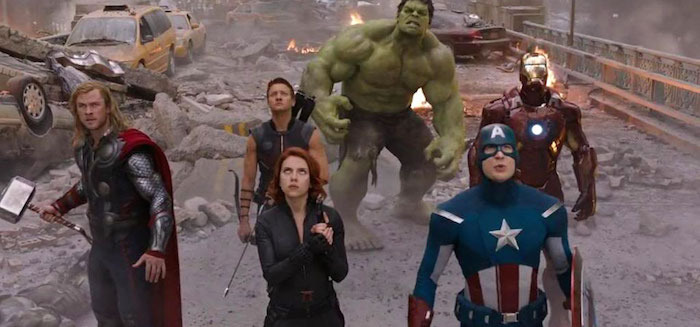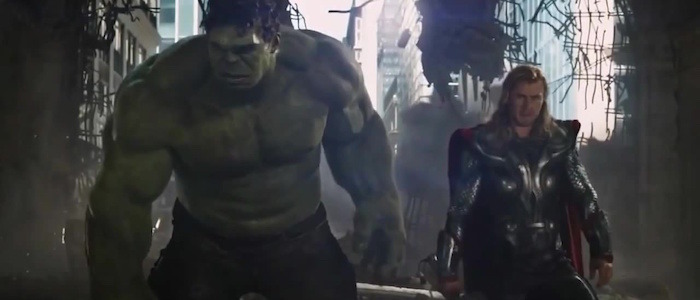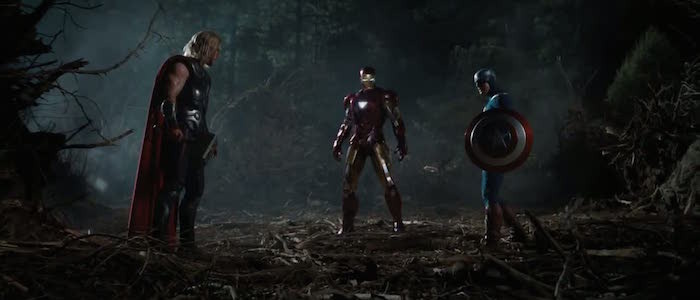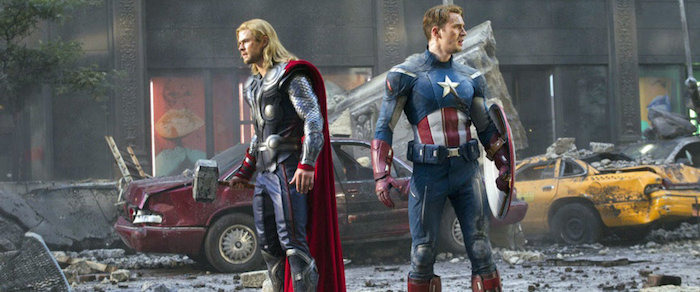'The Avengers' Is The Blockbuster That Transcended Barriers And Changed Everything
(Welcome to Road to Infinity War, a new series where we revisit the first 18 movies of the Marvel Cinematic Universe and ask "How did we get here?" In this edition: The Avengers is a big party of a movie...and a party that may have changed studio movies forever.)The Avengers is the quintessential blockbuster experience. No film before or since has resulted in the kind of global celebration that followed in May of 2012, something even its second sequel Avengers: Infinity War may or may not be able to top despite bringing together twice as many franchises. Only time will tell, but time has been kind to Marvel's first culmination, and not without good reason.
It's a film that changed the way movies were made and watched, impacting everything from industry goals to the mainstreaming of "nerd culture" and fandom. Its lasting legacy isn't just the sprawling Marvel Cinematic Universe, which drops its nineteenth entry into theatres soon (not to mention its seventeenth seasons of television, if you're a complete-is)t. The mark left by the MCU can be felt in almost every other studio's failed shared-universe franchises, from Sony's The Amazing Spider-Man spinoffs, to Paramount's shared film/television Terminator-verse, to Universal's The Mummy-led Monsters series, and of course, to Warner Bros.' own superhero crossover world, which all but fizzled out with Justice League.
And while the failures of its imitators are hardly cause for celebration, it stands to reason that Marvel was far ahead of the curve even before its purchase by Disney. Kevin Feige & co. have been doing it right before anyone else was doing it at all. The proof is in the pudding, and the pudding set to perfection at one very specific moment...
That Shot
You know the one. You remember what you felt when you saw the Avengers assemble for first time, as the camera circles around them and Alan Silvestri's musical theme reached its crescendo. Run a quick search on YouTube and you're likely to find dozens of videos capturing live audience reactions to the scene, from all over the globe and in more languages than you knew the film was even dubbed into. What's more, it's sandwiched between two other major moments that hit similar highs in quick succession. On one side, the Hulk's "I'm always angry" transformation before punching an enormous Leviathan; on the other, his "Hulk? Smash!" moment, in which he's let loose on the alien invaders. It was clear from that sequence on that the Marvel party wasn't going to stop – but it's also a sequence that arrives over an hour and 50 minutes into the movie.
Were it a scene in isolation, we'd have probably put it on a couple of best-action-set-pieces lists and called it a day. But it's a moment that, per critic Bob Chipman, the entire film is built around, answering the looming question asked by the both film as well as audiences of six years ago: can these disparate elements come together and become greater than the sum of their parts? The answer was a resounding "Yes," and what followed was, as Chipman puts it, Marvel's victory lap.
But the reason it works isn't just director Joss Whedon's specifically comic book-like staging. While hiring someone who had actually written Marvel comics was a stroke of genius (his Astonishing X-Men remains one of the best modern mutant sagas), it was both Whedon's penchant for balancing character dynamics as well as his understanding of how to weave together the themes of individual characters that made him the right guy for the job.
While Thor spends a good chunk of its runtime on Asgard, The Avengers is the first Marvel movie that feels like it takes place on an Earth from a comic book universe. An alternate reality we could've conceivably arrived at after the events of films prior, entries in which the settings were all distinctly familiar, from caves to factories to tiny towns – but it especially feels like it follows the fantasy World War II seen in Captain America: The First Avenger.
In each film prior, the superheroes were elements that stuck out in otherwise normal worlds. In The Avengers however, nearly an hour of the film takes place on an invisible aircraft carrier transporting secret, magically-powered weapons; the same weapons Captain America once tried to get out of the hands of HYDRA, the Red Skull's Super Nazis. It's a world where some far-off, unseen villain in space grants Loki the power over mystical objects, setting up something far bigger on the horizon, and it's a world where secret, shadowy international councils have become necessary now that monsters and aliens and men of Iron roam the streets and the skies. But the film isn't as far removed from the real world as its setting suggests; if anything, it's about fantasy and reality rubbing up against one another to see which one wins out.
There is Only the War
Late into the film's final act, after our superhero team has nearly fallen to the alien invaders, the World Council makes a difficult decision. It chooses to sacrifice millions in order to save billions, sending a nuclear warhead straight for Manhattan. It's the kind of dark turn you'd expect of a superhero story like Watchmen, a story that transplants superheroes into a supposedly "realistic" world – but that's the difference between Watchmen and The Avengers, and thus the difference between their outcomes. The fantasy of The Avengers isn't just that superheroes exist as a concept, but rather that these specific people exist. People like Iron Man, Thor, Captain America, Hawkeye, Black Widow and The Hulk, who are willing to put everything on the line and go above-and-beyond to save everyone they can.
It's an idea that's put to the test in future entries, but in this one, it's a mirror to a world of cynicism. A world where the obscured faces of men in suits order an airstrike via a drab, familiar military machine, piloted by an anonymous soldier, to cause destruction in Manhattan – perhaps the site of the 21st century's most recognizable image of destruction – and it's a world where these heroes, with all their smarts and strengths and colourful garb, have been locked out of the biggest scientific advancements of the 21st century.
The Tesseract is a source of unlimited energy. In World War II, the Nazis used it to make weapons. In 2012, the U.S. government used it for the same purpose through S.H.I.E.L.D., rather than bringing in minds like Bruce Banner and Tony Stark to use the mystical object to further their work in the fields of medicine and clean energy. "War isn't won by sentiment," the Council tells Nick Fury, who responds: "No. It's won by soldiers," immediately before recruiting Steve Rogers. It echoes the conversation in The First Avenger, where Tommy Lee Jones' Col. Phillips tells Abraham Erskine that war isn't won by kindness, but by guts. At this moment, all Fury needs is someone who follows orders. Rogers knows the Allies won World War II, even though he was frozen in ice toward the end of it, but he knows something is amiss. "They didn't say what we lost."
What was lost was conscience. Fury & co. are working on bigger, more destructive nuclear weapons than the ones dropped on civilians in Japan, and upon discovering these secret projects – bombs not unlike those built in the real world today – Steve "We have orders, we should follow them" Rogers can no longer remain a man who blindly follows. And so he charges into the battle of New York regardless of the World Council's plans.
Steve, questioning his own commitment to this new U.S. Government, questions the commitment of Tony Stark to the mission in general. Stark is a man who tries to think his way out of every situation, claiming he'd "cut the wire" rather than laying down on it for anyone else the way Steve would – and has, in the past – but Stark only ever thinks of himself. The Iron Man builds monuments unto his own image, scraping the very skies with a building bearing his name. He only figures out Loki's plan when he has his narcissism reflected back to him by the mischievous demigod, who plants his alien flag on Stark's own monument for all the world to see.
While Steve Rogers' arc in this film forms more of a bridge between entries (The Winter Soldier picks up his thread and runs with it admirably), The Avengers is the conclusion to a major part of Tony Stark's story, in which he finally learns to fight for something greater than himself, setting into motion the next phase of his life in which he tries (and fails, repeatedly) to do exactly that. It's all very serious under the surface, even though the form it takes is a fireworks display, and Stark eventually takes the same "one-way trip" that Steve dared to decades earlier (Stark survives his suicide mission, but barely). But despite all this noise about personal loyalties, the most fun element in the film, ironically, happens to be the guy who talks about trying to commit suicide but being cursed with the strength to survive it.
That’s My Secret
A likely reason we haven't gotten a Hulk film since Disney bought Marvel is the character's solo entry would have to be distributed by Universal. That's just a logistical point, but it's a shame given how much fun the Hulk managed to be in The Avengers, not to mention his evolution in the recent Thor: Ragnarok. And the key word there is "fun." Something Whedon & co. understood about the Hulk, which neither of his prior solo films managed to capture, was just how much fun it is to be a big green monster who smashes things! Both moments on either side of the Avengers assembling are Hulk-centric action beats, and regardless of whether or not the "I'm always angry" line fits the broader narrative, it became instantly iconic because of what followed.
Is Bruce Banner always angry? Mark Ruffalo certainly brings a nervous energy to the character, but his actual anger is never quite the focus of his story. It's unfortunate we haven't yet gotten a Marvel film that deals with this element of the Hulk, but what we do get here is an arguably superior version of the character's arc in The Incredible Hulk.
Dr. Bruce Banner resents the Hulk. It prevents him from living a normal life, a regret he expresses to Natasha Romanoff while rocking an empty crib – a thread Whedon picks up once again in Avengers: Age of Ultron. Banner wants to steer clear of anything that could turn him green & mean (it's been a year since his last incident), so having his isolation intruded upon bothers him to no end. Tony Stark is certainly fascinated by Banner, but the good doctor believes no good can come of the Hulk, despite Stark's insistence on there being a higher purpose for him.
When Banner first transforms, his face mid-transition is stamped with the fear of what he might do to Natasha, after which the Hulk is presented much like he was in his first Incredible Hulk appearance. In shadow, like a monster. He even chases a woman while knocking down walls, recalling the first appearance of Obadiah Stane's Iron Monger. This Hulk ought to be a villain. He's trapped in a cage of Banner's own making, and letting him out unwillingly has disastrous consequences.
Letting him out intentionally, however, is a different story. It's Banner embracing everything he is on the inside, "always angry" or not, and using that emotional momentum to take down a space serpent before leaping up the side of a building to smash aliens into walls. He isn't just embracing the monster's anger, though. His smile before he leaps off and the ensuing mayhem indicate that he's having fun with it – which is exactly why it's fun for the audience. By the end of it, he's the one who saves Tony Stark from falling to his death, a moment that builds upon his story and, by all accounts, elicited just as much of an enthusiastic audience response as his other moments, because it's the first time we see the Hulk use his powers for something other than destruction.
A higher purpose indeed.
Gods and Humans
On one hand we have Thor and Loki, figures of myth and legend who may as well be Gods. On the other, Hawkeye and Black Widow, assassins who use bullets and arrows and who ought to have no place in this narrative. And yet, it's exactly this dynamic that makes all four characters vital to The Avengers. They're the extreme ends of the spectrum within which this world operates, with the Asgardian princes representing the operatic grandeur of a story about armoured aliens from magical kingdoms, and Clint & Natasha helping ground the entire affair by reflecting the real-world effects of super powered battles.
Thor and Loki's arcs may be at a standstill by this point – their story here, much like Captain America's, is connective tissue between solo entries – but it's in their interactions with elements like Hawkeye and Widow that the fabric of this world becomes clear, along with Agent Phil Coulson, whose death catalyzes Tony Stark into action. As for the spies working from the shadows, Natasha is one of the team's most interesting elements. She fights shoulder to shoulder with the Avengers to not only escape a grimy, bloody past, but to make up for it. She's a foil to Hawkeye, who's never had to contend with this sort of guilt before – if anything, his conscience is clear, having rescued even Natasha when he was supposed to have killed her – but more recent events have forced him (quite literally, via Loki's mind control) to take innocent lives. "Don't do that to yourself," she tells him, when he asks how many people he killed. Natasha knows full well the path of having to deal with the consequences of being a killer – another element that forms the thematic backbone of this film's sequel.
Neither Black Widow nor Hawkeye take narrative precedence by any means. Some say they're wasted in the film. I disagree, and it isn't just because they each get stellar action beats in the battle of New York. Similarly, Thor, after a solo entry where he faces up to being a warmonger, finally accepts that Asgardians may not be much better than humans, likening his brother and even himself to mystical creatures that destroy everything in their path. These three heroes, like Banner, see themselves as monsters with destructive capabilities. That's four out of the six Avengers, people who according to Loki "lie and kill in the service of liars and killers."
Which is exactly why the camera circling around the entire team works as well as it does. They're all out to prove they can be more than what they appear to be. More than just a group of squabbling misfits in close proximity, something Loki sought to take full advantage of with his intentional capture, and more than hired guns in service of a two-faced government. And it's after they're torn apart on the Helicarrier that they have to work towards being more, hesitating to lift their hammers and bows and shields before doing what needs to be done.
They need to prove they're more than just an archer forced to kill against his will; more than just an assassin with red in her ledger; more than just a monster who puts people in danger; more than just an unruly brute with a hammer; more than just a soldier following orders; more than just a man who fights for himself. It's that shot that tells us these characters may be able to work together and be more. Not long after, it's an unbroken, fluid take moving all across New York City that proves it, a shot in which we see them working in tandem to take down the invading forces. And finally, after having been beaten down a second time – and after it feels like the world, our world, has lost faith in them enough to drop a bomb in their heads – they get back up, save each other's behinds, and assembling one final time to take down Loki. Not by killing him, no, but by capturing him, even if that's exactly what led to their downfall the last time.
A Statement of Intent
All that said, I couldn't tell you what the hell the political outlook of this film actually is. Nick Fury's belief in militaristic prevention turns to belief in The Avengers seemingly without reason (would swapping out The Avengers for rogue soldiers make a significant thematic difference?), and Fury's manipulation of Coulson's death doesn't have any bearing on the overall narrative since his death was felt regardless. But this also seems like the one time the series' muddled politics don't really matter, at least not to the same degree as its predecessors. It certainly ought to; this is now one of global culture's biggest shared artifacts, and it builds on an already shaky political foundation. But it was also a statement of arrival that allowed for a clearer articulation of political parallels in future installments.
Art should certainly be judged on its merits. I wouldn't have spent thousands of words exploring my misgivings about the series' politics thus far if I didn't believe that. Their political and military outlook is a central facet of their collective identity, and understanding our gravitation toward them is just as much an exploration of large-scale entertainment as it is an exploration of the shared language we're comfortable speaking.
And yet, judging the end result of studio products like these does also demand an understanding of how they came to be. Critic Matt Zoller Seitz calls these films "movie-flavored products" and I'd be hard pressed to disagree, even though I love them dearly. They are, first and foremost, made to make money. They don't have to have anything interesting to say, at least not for shareholders to be happy. Which isn't to suggest being thrown a bone in the form of any semblance of coherent statement is laudable in and of itself, but it's understanding how these movie-flavoured products came to define so much of our modern popular culture that I find to be the most exciting part of this "Road to Infinity War."
At the end of the day, it's still storytellers at all levels, from writers to producers to directors to actors, even to set and sound designers, trying to inject intent and meaning into products that, by nature, don't need to be anything more than products. These films don't start out as coherent manifestos before being watered down, although a coherent manifesto would certainly be ideal (see also: Black Panther). More often than not, they begin as a checklist of what's required to hit all the correct selling points. And it's from that point of inception, not to mention the often horrendously anti-art process of studio notes during, that these movie-flavoured products come to be, with all that we connect to as people – individually and culturally – smuggled in and sometimes even fought for, by storytellers whom the studios often consider replicable.
It's far from an ideal world, but it's a world in which against all odds, The Avengers were brought together to create something meaningful, and something impactful that transcended barriers of language and tradition. The film's closing moments feature an on-screen collection of reactions to the Avengers' antics from all around the globe. Some are critical of the financial and cultural role of superheroes in society. Others celebrate these new icons and the spectacle they bring – not unlike the conversations we're still having about The Avengers today. And certainly not unlike the conversations the Marvel films would themselves go on to have in future installments that would further dominate the cultural landscape. Marvel's world, like ours, is one in which The Avengers changed everything.




